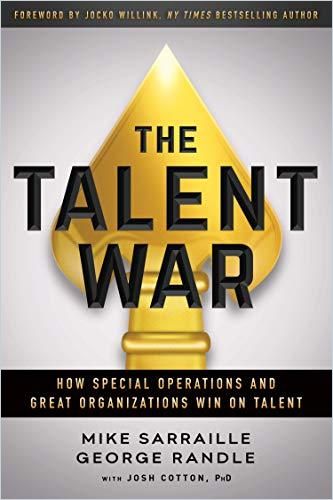“Experience Tells People What You Did. Your Character Tells People Where You’re Going.”

George and Mike, why has Special Operations become so good at recruiting?
Mike Sarraille: Special Operations, unlike the business world, doesn’t look at prior industry experience. The talent pool from which they draw includes young 18-year-olds to 30-year-olds. Some of them are coming straight out of high school; others are coming out of the top universities. They don’t really have that much extensive work experience. So by nature, the Special Operations community had to become very good at what we call potential-based hiring.
What do you mean by potential-based hiring?
Mike Sarraille: The focus is on the question: Does this person have the potential to become a high-performing contributor within Special Operations or their organization? Now, Special Operations training is designed to push people to the limits. It is designed this way not because we love to see people in pain freezing in the water until they quit. No, we push them to their mental and physical limits because that’s when true character emerges. To be able to assess people based on their attributes and their character, you have to become very skilled. The ability to do so is what the Special Operations community can bring to the business world.

So objective measures like diplomas and work experience become less important hiring criteria…
Mike Sarraille: Does your résumé speak to your character whatsoever? No, it doesn’t. Experience tells people what you did. Your character tells people where you’re going.
George Randle: Mike’s got it exactly right. Special Operations knows what they’re looking for when it comes to character attributes. They know what success looks like. Business generally doesn’t. Companies often default to the lazy position that says, “I’m looking for someone with two or four years of experience working at a certain kind of company or within a certain kind of industry.” However, objective criteria, such as your degree or GPA, are not predictive of success in the role that you’re hiring to.
Hiring for character involves focusing on attributes that are more or less subjective. Prior to interviewing a person, what are some of the data points about an applicant to look out for if you don’t want to put too much emphasis on formal diplomas and employment history?
George Randle: One of the things that Mike and I take great pains to point out in the book is that you’re not going to hire somebody with no experience to be your CEO. Experience does matter, but it matters only to a limited point. What Mike and I look at is what’s behind the accomplishments on the paper.
Objective criteria, such as your degree or GPA, are not predictive of success in the role that you’re hiring to.
George Randle
What are some of the extracurricular or biographical backgrounds that could be indicative of the character traits you are looking for?
George Randle: With regard to extracurricular activities or the degree or a particular accomplishment, we ask, “What is the how behind that? What are the attributes that drove you to achieve that? What are those critical drivers?” These are the things that you don’t list on the résumé but are really the core foundation of how your résumé and your life experience came together.
What can the business world learn from Special Operations with regard to the hiring process?
Mike Sarraille: What sets Special Operations apart from the business world – and this the business world can replicate – is that Special Operations puts a lot of effort into the hiring process. They have designed a process that is now over half a century old. It is a two-year, multivariate process that looks at the aggregate of many different data points to make a very educated decision. Special Operations then continues to track every single hire. If a person turns out to be an underperformer, we ask what we’ve missed during the hiring process, and how we can watch out for that in future candidates. The hiring process thus keeps evolving. We stay ahead of our competitors by looking at what the SEAL teams or the Green Berets need five years down the road, not just today.
Hiring – and leading in general – is a very human-centric task.
Mike Sarraille
There’s been a push to use AI to select potential job candidates based on “objective” criteria, but what you are advocating for is to look at a person as a whole, to humanize the hiring process.
George Randle: AI can only deal with fixed parameters on a résumé; it doesn’t see the dynamics of a team. AI does not understand the nature of what is changing in the world. It doesn’t get the entire picture. It doesn’t grasp the whole person concept that we talk about in the book.
Mike Sarraille: At the end of the day, hiring – and leading in general – is a very human-centric task. And you can’t outsource that final decision of whether you’re going to hire somebody or reject somebody to AI. AI is going to be wildly wrong when it comes to dealing with humans, which are the wildest variable in any equation.
Still, you do caution in the book that we need to be aware of our human cognitive biases. In particular, you talk about the “likability trap.” How do you avoid it?
Mike Sarraille: Whether a certain job candidate likes bowling because I like bowling is irrelevant to the person’s ability to perform in the position. It’s natural for people to want to hang out with people they enjoy having conversations with. However, I worked with people I really didn’t like, but they were high performers, and I could respect them as professionals. We can put our differences aside for the good of the organization and drive results. Whether I hang out with them on the weekend is completely irrelevant.
George Randle: Most hiring tends to be very siloed. You have a hiring manager in a particular team, and there is no outside influence. The process becomes very homogenized when everybody is looking at candidates through the same lens. The way to avoid the likability trap is to include people in the hiring process who have no stake in that particular team. You have to work hard to remove your biases. Likability is the one that creeps in very quickly. But if you have a culture of empowering people and you’re driven by performance, it’s like Mike said: I may not want to have a beer or dinner with that person, but I trust them and want to hire them because they are going to help us accomplish our mission.
The way to avoid the likability trap is to include people in the hiring process who have no stake in that particular team.
George Randle
What about hiring for “culture fit”?
Mike Sarraille: We think that people often define “culture fit” in the wrong way. What culture fit really means is that you’re looking for people whose values align with yours, whatever those values are: the pursuit of excellence, integrity, communication or empathy.
What does a world-class talent acquisition program look like?
Mike Sarraille: A world-class talent acquisition program is as much about process as it is about the people in charge of your hiring. B-players are going to hire nothing but C-players, which does not accelerate your organization. Special Operations takes their very best off the battlefield – and, let me tell you, these guys don’t want to be taken off the battlefield! But we put them in charge of what we call “assessment selection” because they have the ability to say, “This young man or woman has got more potential than I did at their age.” In addition, we train these A-players on the hiring process. We teach them on biases so they can call each other out.
A-players are attracted to A-players – they want to work for the best bosses.
George Randle
You want a broad range of people involved in the hiring process. What role, ideally, do Human Resources departments play in the hiring process then?
Mike Sarraille: We believe that some of your strongest performers in the company should be in Human Resources. It is a strategic function. Again, Special Operations understands this. This is why we put so much emphasis on selecting the right people and a whole lot more time into their development. Talent attracts talent.
George Randle: Exactly, that’s it. A-players are attracted to A-players – they want to work for the best bosses. They want to work with the best organization. They want to have a mission. They want to be challenged. They don’t want something that’s easy.
Talent attracts talent.
Mike Sarraille
Mike Sarraille: The United States Marine Corps has become one of the greatest talent magnets because of its people. Everyone is in charge of hiring. When members of the Marine Corps are out in town, they represent their organization. I joined the Marine Corps because I wanted to become like a Force Recon Marine I met. He was handsome. He was humbly confident. He was respectful to everyone. I wanted to be that person – which made me want to join the organization he was a part of. Everyone has to be a talent magnet for their organization.
So you are saying that in order to attract the best talent, you must already have the best talent in place…
Mike Sarraille: A lot of companies have a customer value proposition: “Here’s our product. This is why it brings value to your life.” But they rarely advertise the employee value proposition to future potential candidates for the company. At the end of the day, people want growth. They want autonomy, they want ownership over their lives. They want acceleration opportunities, and they want to work for great leaders. And you almost have to get that part first before you develop your hiring process. It starts out with the people you have.
About the Authors
Mike Sarraille is the CEO of Talent War Group, an executive-search and talent-advisory firm. He is a former Recon Marine, Scout-sniper, and retired US Navy SEAL officer with 20 years of experience in Special Operations, including the elite Joint Special Operations Command. George Randle is a Strategic Advisor to Talent War Group, former US Army officer, and Vice President of Global Talent Acquisition at Forcepoint, a human-centric cybersecurity company. They are the authors of The Talent War.







